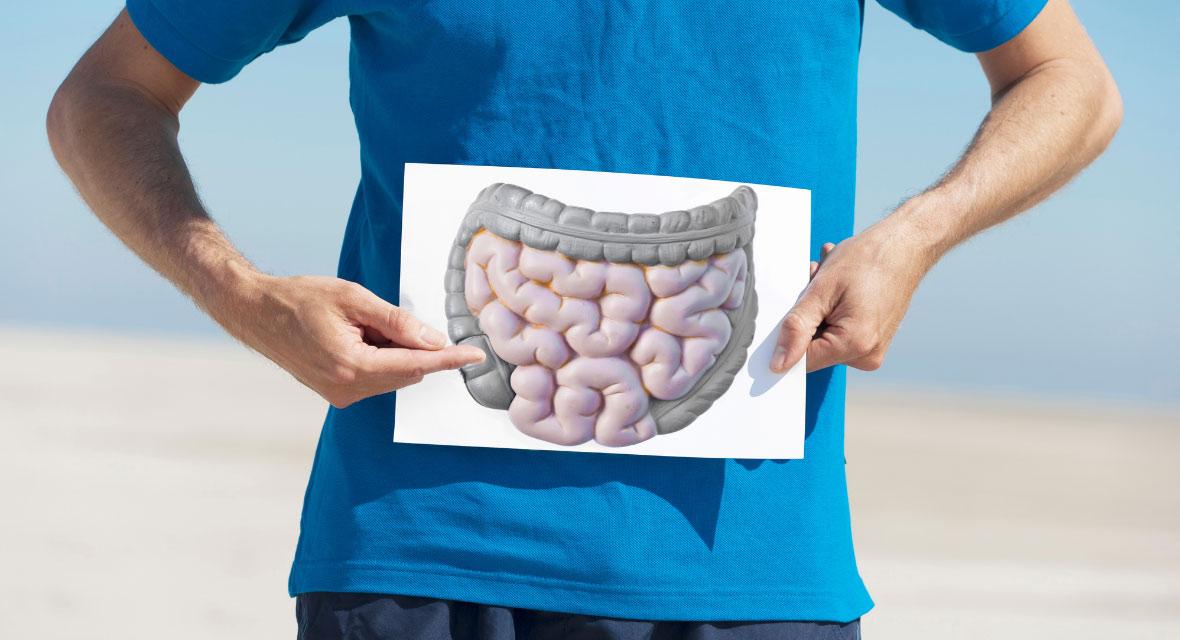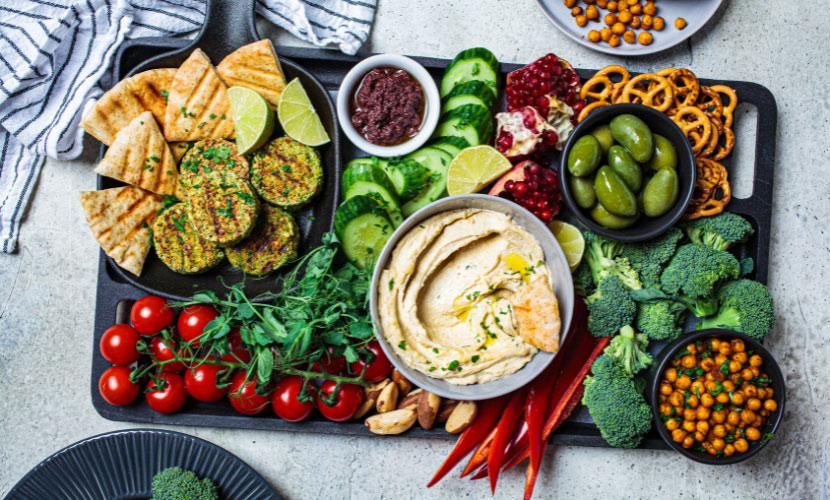🏆 As seen and loved on Shark Tank Dubai 🏆

Gut Microbiomes and Your Health
Microbiomes Role in Nutrition and Health
Do you know there are some healthy bacteria?
While some bacteria cause diseases, millions also perform various productive functions in your body. Your body contains microscopic living things like bacteria, fungi, and viruses. Together they are called the microbiome.
All body sites have their distinctive communities. The human gut houses the largest community of bacteria, including 500 to 1000 species.
Fun Facts* There are approximately 40 trillion bacterial cells in your body and only 30 trillion human cells. You are more bacteria than a human.
Gut Microbiome
Your gastrointestinal tract has trillions of bacteria, viruses, fungi, and other microscopic living organisms. Most of these microbes exist mainly in your large intestine and are found in "pockets" called the cecum. Together they form the gut microbiome, also called gut flora and gut microbiota.
It is key to several aspects of human health, including digestion, immunity, metabolism, neurobehavioral traits, and many other integral functions. These bacteria supply essential nutrients, synthesize vitamin K, aid the digestion of cellulose, and promote angiogenesis.
Effect of Gut Microbiome on Your Body
Their primary function is to break down food and turn them into nutrients that your body can consume. Good bacteria are an irreplaceable part of your gut flora, and they do much more than just digest your food.
Along with these healthy microbes, there are several harmful microbes too. The imbalance between both healthy and unhealthy microbes can lead to much more than an upset stomach. The disparity can lead to weight gain, high cholesterol, diabetes, and many other disorders. Thankfully, good bacteria multiply fast and don't give space for harmful bacteria to grow. A healthy balance is called equilibrium.
Any change in the composition of the gut ecosystem can disturb this equilibrium. Many factors can aid in this variance. Some of them are:
- Illness
- Stress
- Aging
- Antibiotics
- Bad food
- Unhealthy lifestyle
Role of the Gut Microbiota in Nutrition and Health
- Digestion - It lines your entire digestive system. The bacteria produce necessary enzymes, break down your food, produce chemicals that kill bad microbes, and lead to better absorption of nutrients.
- Immune system - 80 % of your immune cells are located in your gut. The microbiome can communicate with "immunity cells" and play an important role in how your body responds to infection. Allergy, asthma, autoimmune disorders, and inflammatory diseases can be linked to dysbiosis in gut flora.
- Diseases - The abundance of a specific type of bacteria may give rise to certain conditions such as inflammatory bowel syndrome, ulcers, bowel perforation, etc.
- Obesity - Gut dysbiosis (imbalance of healthy and unhealthy microbes) contributes to weight gain. These bacteria determine how many calories you derive from food and what nutrient you absorb. Too much bowel bacteria can turn fiber into fatty acids. Studies say that the microbiota also influences eating behavior, leading to consuming more food than required.
- Cardiac health - Studies found that gut flora plays a crucial role in promoting good HDL cholesterol and triglycerides. However, you can blame some unhealthy species for producing trimethylamine N-oxide (TMAO). TMAO may cause stroke and heart attacks.
- Diabetes - It influences blood sugar control. Gut dysbiosis reshapes the intestinal barrier and signaling pathways that either directly or indirectly affect insulin resistance in type 2 diabetes.
- Brain health - It helps the brain function in several ways. The happy chemical 'serotonin' is primarily produced in the gut. Moreover, it is connected with the brain through the network of millions of nerves.
- Cancer - They are also linked to the third most widespread cancer—bowel cancer. In the bacteria world, there are both good guys and bad guys. Studies show that there are several DNA-damaging and carcinogenic bacteria in the human bowel. However, Lactobacillus and Bifidobacterium are known for preventing the formation of tumors.
- Other benefits - Gut flora benefits its host in multiple ways. It regulates bowel motility, transforms bile acids, absorbs minerals, and activates and destroys toxins.
Improving Gut Health Naturally
It is already established that an unhealthy stomach may cause many chronic diseases, such as ulcerative colitis, obesity, autism, and even cancer. Interestingly, keeping your digestive system right as rain can be one way to prevent serious illness caused by the gut microbiome.
"The majority of diseases begin in the digestive tract when good bacteria are no more able to control bad bacteria."
– Elie Metchnikoff, The Father of Probiotics and Nobel Laureate
15 Tips for A Healthier and Happier Gut
- Exercise
- Eat Healthily
- Eat a diverse range of food
- Eat fermented food
- Avoid artificial sweeteners
- Eat whole grains
- Chew your food properly
- Eat prebiotics
- Eat more fibers
- Fluid up your body
- Try a plant-based diet
- Avoid or reduce antibiotics intake
- Eat food rich in polyphenols
- Eat smaller and more frequent meals
- Manage your stress level
Physical activities aid in regular and easy bowel movements. Research has shown people following a sedentary lifestyle have a less diverse gut microbiome. You don't need to be an Olympian to reverse the gut flora. Just 150 minutes of vigorous workout in a week can get your colon moving. Choose your muse — walking, jogging, cycling, or even dancing. It doesn't matter what physical activity you pick; just keep moving.
Try to eat a clean, balanced diet. Avoiding junk food and consuming a lot of fresh, unprocessed, and pure foods are the first steps towards eating healthfully.
The diverse range of food means a distinct microbiome. A diet consisting of a wide variety of whole foods, fruits, vegetables, and a range of whole grains leads to a multiple microbiome. Each nutrient promotes the growth of a different type of bacteria. Unfortunately, the modern-day diet is devoid of diversity. No matter what diet you follow, it is important to incorporate variety into your weekly food menu.
Fermented food is a rich source of natural probiotics. Naturally fermented foods such as yogurt and kefir contain lactobacillus bacteria that can reduce the number of disease-causing species in the stomach.
Artificial sweeteners are toxic to these bacteria. Many people consume considerable amounts of artificial sweeteners in drinks and foods without knowing. Artificial sweeteners not just disrupt the gut flora but also make good bacteria pathogenic, which attack the wall of the intestines.
Guts love grains. So, swap your refined and processed grains for whole ones. They contain a healthy amount of fiber that causes the release of good enzymes to aid fiber digestion. Several studies claim that whole grains like brown rice and whole wheat/barley cereals increase bifidobacterium and lactobacillus. Thus, eating these grains boost your immune system and reduce abdomen inflammation. On the other hand, eating refined or processed food can lead to gut dysbiosis.
Eat your liquids and drink your solids. The age-old advice can be key to healthy digestion and easy bowel movement.
Prebiotics promotes the growth of healthy bacteria. Include prebiotic-rich food in your diet, such as apples, bananas, berries, artichokes, cocoa, etc.
Dietary fibers that we mainly find in whole grains, fruits, vegetables, and legumes benefit humans. It normalizes bowel movement and maintains health, lowers cholesterol levels, controls blood sugar, and maintains a healthy weight.
Drinking water and healthy drinks have an advantageous effect on the intestine's mucosal lining that aids in the growth of good bacteria. Hydration is vital for a healthy bowel.

Vegetarian and vegan food reduce the population of disease-causing bacteria such as E. Coli in the gut. Thankfully, there is no dearth of variety when it comes to vegan food.
Antibiotics are meant to be taken cautiously and only when necessary. Antibiotics kill both harmful and good bacteria. Once stopped, the good bacteria multiply back. However, if you take antibiotics for a prolonged time, it can adversely affect the equilibrium of gut flora.
Green tea, dark chocolate, etc., are packed with polyphenols that are broken down by the gut microbiome. The process stimulates healthy bacterial growth in your bowel.
Large meals overwhelm the gastrointestinal tract. Eat smaller meals for better digestion and induce fat burn.
The gut affects stress, and stress affects the gut. These microbiomes affect your mental health and stimulate the growth of mood hormones. If you are feeling stressed, your bowel can feel it too. Meditation, yoga, and relaxing exercises can help to manage stress levels.
Bottom line
"Gut health is the key to overall health." – Kris Carr
A healthy gut is imperative to your body's overall well-being. Trillions of microbes in your gut work harmoniously to keep you in good health. Your lifestyle dictates how it impacts your gut flora.
To support the growth of healthy microbes, you must eat clean, exercise on time and drink plenty of fluids. Make small positive changes in your lifestyle to keep your gut healthy. We can take care of the menu and meal planning and get you a weekly healthy meal plan. Whatever your special dietary requirements are, we have got you covered. Healthy and nutritious meals, rich in essential nutrients, are just a click away.
Reach out to start your fitness journey with us!
Meal Plans
Delivery Details
Legal Information
© 2020-2026 VMeals. All rights reserved. VMeals™ is a trademark of Flip Side Restaurant and Cafe L.L.C
We accept
